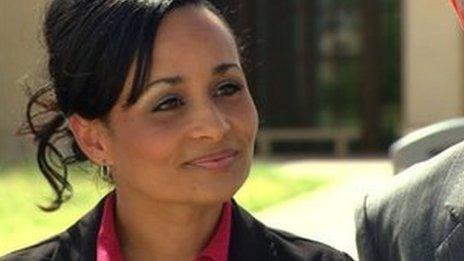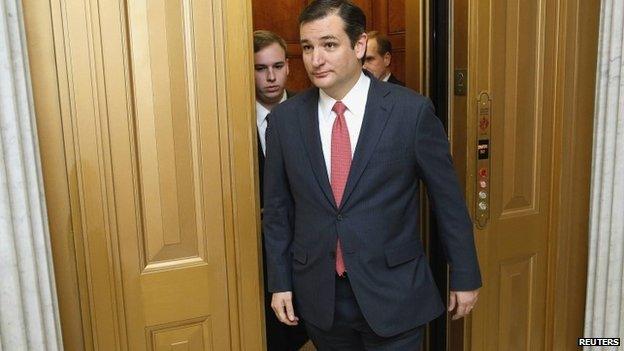Tea party not over yet in Texas
- Published
- comments
.jpg)
His spurs jangling, Tom, the ranch manager, grasps a razor-sharp penknife in one blood-stained hand and strides to the next young bull as it's dragged across the yellow dust of the corral.
Four cowboys go into action, pinning the animal to the ground, one eye staring rather piteously at the heavens.
Another man moves in, grasping in each hand, not a Colt revolver but a hypodermic gun, filled with vaccine. Then Tom moves in, cuts the calves' ear and castrates it.
He assures me it doesn't hurt them, not that much.
At this ranch in Northern Texas they are determined to keep the old ways alive. They do their round-ups on horseback, not in a lorry
It's not just a job, Tom says. "It's what you, do a way of life. We all grew up working for Ma and Pa, and here, a handshake is your word.
"That America is going."
He says there is too much political correctness, the country is way too liberal and conservatives need to stand up for Americans.
"I think we need to do something about the border situation, but I don't know how you fix it."
I ask him if the American values he's talking about are shared by others.
"Not very many. No. The urban people - I don't think they do, like we do out here."
'Unheard of'
I've come to Texas for a radio documentary, partly because immigration is a key policy battle in the Republican civil war.
The other reason I came here is because of the perception that recent primary elections in Texas were the high water mark for the tea party movement, where veteran Republican Congressman Pete Sessions beat back a challenge by the ambitious and charismatic Katrina Pierson.
But Ms Pierson is not the typical tea party candidate - she's a black single mum. When I last met her, in the middle of the US government shutdown, she was predicting victory.
So I ask what went wrong.
"The other guy had millions of dollars and 20 years of name recognition," she says.
But still, is it a sign that her movement has been beaten by the establishment?
"You'll hear that a lot because they want the tea party to go away," she responds. "If the tea party is dead or going away they sure are spending a ton of money to keep us out."

Katrina Pierson says her gaining 42% of the vote was a "victory for the grassroots movement"
Matt Renaldi describes himself as one of the founders of the Texas tea party. For him it is third time lucky - he has just made it into the Texas House of Representatives. He says the notion of tea party decline is only based on a couple of elections, including Katrina's defeat. He says at a state-wide level in Texas the picture is quite different.
"I saw the New York Times article taking that point of view, external and that was as incorrect as you could possibly get. They didn't look at the state races. At the state level we completely shook the Texas government to its foundations. In race after race tea party candidates beat much better funded establishment candidates."
The Democrats think this is true too.
Few Hispanic Republicans
"The Republican Party has moved to the far right," Texas State Representative Rafael Anchia, a Democrat, says. "Ten years ago it was centre right, now it is extreme right and far out of step with the general electorate."
"The extremists are now governing. I have admiration for mainstream but the extreme right is so ideologically motivated that it is impossible to get things done, and to solve problems."
One of those problems is illegal immigration. How it is handled makes a huge impression on Hispanic voters.
They are increasingly important - Mr Anchia says state-sponsored research indicates they will be the biggest ethnic group by next year. Other research suggests a later date, but the trend is beyond doubt.
President Ronald Reagan said that Hispanics were Republican, but just didn't know it yet. They still don't, and Mr Anchia says it is entirely the Republicans' own fault.
"This is not a by-product of anything we've done in recent years," he says.
"Republicans are pushing them into our camp with their vitriolic rhetoric and policies that speak to an 'otherness' of the Latino community. There have been hateful and xenophobic laws. We are part of this community, woven into the fabric of what is America, and we reject the narrative of otherness for Latinos.
But for Matt Renaldi, "tone plays an important role".
"My father was an Italian immigrant, I am first-generation American. To me, when my father came over, he did everything right.
"Now he sees people cutting in line and it's an insult to legal immigrants like him. That's a legitimate reason to curb illegal immigration.
"That's apart from the cost to society - you can't have a welfare state and leave your doors open."
Essence of America
In the middle of downtown Dallas is a wonderful piece of outdoor art that combines the city's artistic, cultural ambitions with a tribute to old Texas - a herd of bronze cattle, nostrils flaring, tails caught in mid-swish careering down a hillside and across a real river. To one side a lone cowboy, horse leaning at an angle, pushes one recalcitrant beast back to the drive.
There's no doubt the tea party have ridden herd on their party - stampeding it to the right.
From a distance it can seems like an antique relic, people clinging to a romantic notion of a past that never was.

Texas US Senator Ted Cruz is one of the tea party's success stories in the state
But what they don't get in Washington is that in much of America, those old virtues and values - some times harsh, intransigent and not a little resentful - are seen as the essence of America.
An essence that is slipping through their grasp.
There are dangers in that for the Republican party, uncertain of its own vision and direction. The drive to the west is over, the land conquered long ago.
But the battle for what America is to become is still raging and the tea party is at the heart of it.
The radio documentary, The Party of 'No'airs on Radio 4.